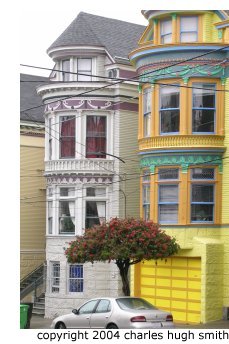

|
| weblog/wEssays | home | |
|
Hidden Costs of the Housing Bubble (March 31, 2006)  An akamai (Hawaiian for astute) reader pointed out an enormous financial burden being
placed on non-wealthy homeowners by the housing bubble: rising property taxes. Revenue-hungry
cities and counties are re-assessing all real estate at new, bubble-era prices, and
adjusting the property taxes skyward accordingly. I have heard anecdotal evidence of this in locales
ranging from Virginia to Hawaii.
An akamai (Hawaiian for astute) reader pointed out an enormous financial burden being
placed on non-wealthy homeowners by the housing bubble: rising property taxes. Revenue-hungry
cities and counties are re-assessing all real estate at new, bubble-era prices, and
adjusting the property taxes skyward accordingly. I have heard anecdotal evidence of this in locales
ranging from Virginia to Hawaii.
It is possible, of course, to lower the assessed value of your property after the housing bubble bursts, but cash-starved municipalities do not necessarily make that an automatic process. Generally, you have to fill out a form and then wait months for the re-assessment to occur. Given that other revenue streams will be in sharp decline during a recession, the assessors' office will no doubt be instructed to be rather parsimonious in handing out lower assessments. The net result: all property owners will be paying for the housing bubble via much higher property taxes. Some states, including that well-known tax haven, California (that's a joke, folks) have limits on assessment and property tax increases (i.e. Prop 13 caps): it is 1% a year here in the Golden State. That's all well and good for property owners who bought long ago, but what about recent buyers? The absurdly inflated property taxes they are paying as a result of the housing bubble exacerbates the huge inequality that exists between those who bought cheap decades ago and recent buyers. The oldsters' property tax might be $600 annually, while their new-buyer neighbor is saddled with a nearly $10,000 annual tab. These are not invented numbers, but actual numbers from our own town. This, mind you, is for a wretched, should-be-bulldozed "fixer-upper" in a blighted neighborhood which sold for over $400,000. For a fixer-upper in the oh-so-desirable Berkeley Hills, well, that's an $800,000 price tag, which in high-tax Berkeley translates into an annual property tax bill of almost $20,000. $1,600 per month just to pay property taxes and other local taxes? (mosquito abatement, bond issue for new library, etc. etc.) By any sane measure, that would be enough to pay the mortgage, fire insurance and taxes. Do I heard chortling from deep within the bowels of City Hall?  Another pernicious fallout from the housing bubble may be rapidly rising "official" inflation rates.
As I have pointed out here before, the Federal government's method of calculating inflation has long been
manipulated in order to keep it low by under-estimating medical and housing costs.
Another pernicious fallout from the housing bubble may be rapidly rising "official" inflation rates.
As I have pointed out here before, the Federal government's method of calculating inflation has long been
manipulated in order to keep it low by under-estimating medical and housing costs.
Housing, fully 40% of the weight in the calculations, is based solely on rents, which have plummeted 20% nationally as the housing bubble inflated and millions of people switched from renting to owning. Fully 70% of the populace now owns their own home. But does the consumer price index reflect higher property taxes, or the effect of rising interest rates on all those holding adjustable-rate mortgages? No, for it doesn't consider the costs of homeowners at all. One effect of the bursting of the housing bubble will be rising rents as construction of new housing dries up and people begin losing their homes. Yes, rents will stay cheap in over-built exurbs like Manteca, CA, where there's 7,000 new houses in the pipeline and zero new buyers; but if you're going to rent, why put up with a 4-hour commute each day to get home? Not only that, but even those exurb rents won't stay cheap. As desperate gamblers (oops, I mean "investors") realize that rents will never cover their costs and their "investment" will remain a gaping hole in their cash flow forever, they will join the flood of foreclosure refugees who have given up their homes and voted with their feet. Banks are notoriously wary of becoming landlords; they would rather dump a property for 60 cents on the dollar than try to rent out and maintain hundreds of homes. So the reality will be hundreds of locked-up houses awaiting auction, and growing demand for rental houses in conveniently located neighborhoods. As people exit the shattered Paradise of homeownership, increasing demand for rental housing, landlords will only be too happy to respond with incrementally higher rents. (Recall that since they've taken a 20% hit since 2000, from their view they're simply getting back to level ground with a 20% increase in rents.) This will show up in the CPI, causing inflation to rise even as the economy falls deeper into recession--an apparent conundrum, as costs usually fall when demand for goods and services falls. This will be the bad karma consequence of manipulating the calculations to make inflation appear low all these years. This is an updated and expanded revision of an October 2005 story on the same subject. copyright © 2006 Charles Hugh Smith. All rights reserved in all media. I would be honored if you linked this wEssay to your site, or printed a copy for your own use. |
||
| weblog/wEssays | home |